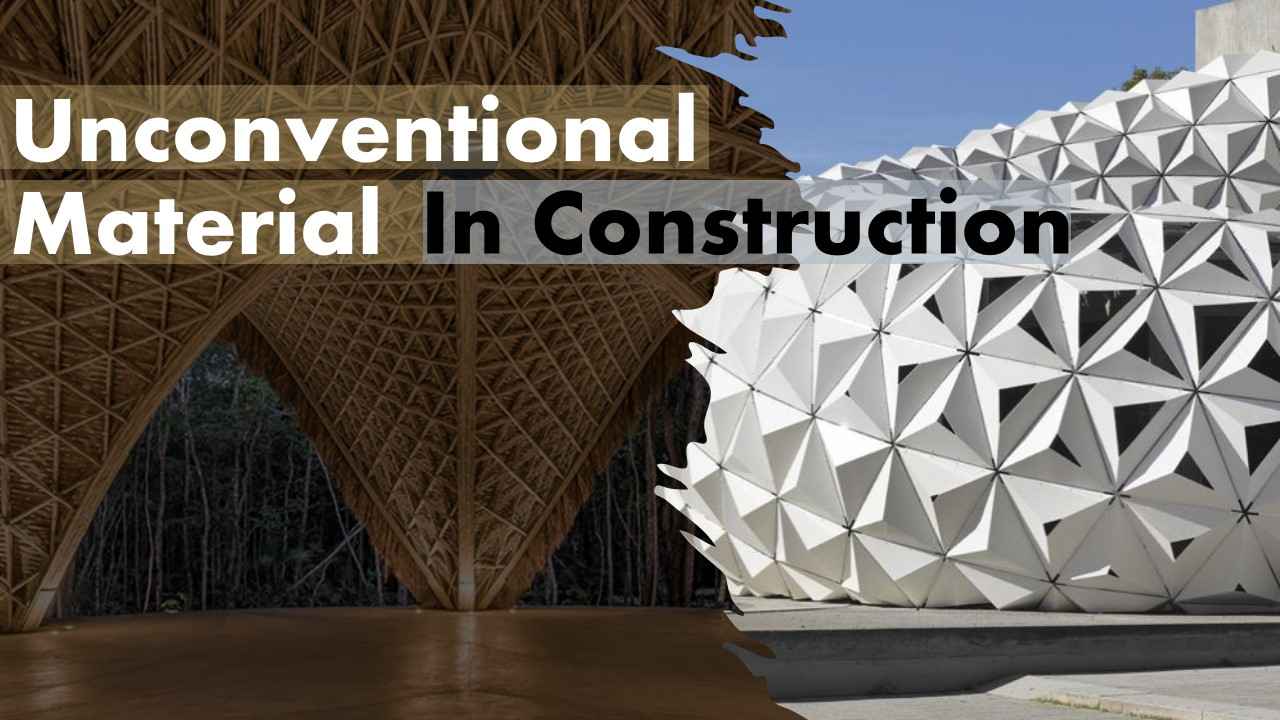Unconventional Materials in Construction
- By
- Pooja |
- February 25, 2024 |
- Civil Engineering, Construction,

Table of Contents
Bamboo: A Versatile and Sustainable Building Material
Recycled Plastics: Transforming Waste into Building Blocks
Mushroom-Based Materials: Fungi as the Building Blocks of Tomorrow
Challenges and Opportunities of Unconventional Materials:
The construction industry has traditionally relied on conventional materials like concrete, steel, and wood for building structures. However, in recent years, there has been a growing interest in exploring alternative materials that are not only sustainable but also offer unique properties. This shift towards unconventional materials, such as bamboo, recycled plastics, and mushroom-based materials, represents a paradigm shift in the construction sector. This article delves into the innovative use of these materials, examining their sustainability, durability, and potential impact on the future of construction.
Bamboo: A Versatile and Sustainable Building Material
Bamboo, a fast-growing grass, has gained recognition as a sustainable alternative to traditional construction materials. With its remarkable strength-to-weight ratio and rapid growth, bamboo is being used in various construction applications. One of its key advantages is its renewability – bamboo can be harvested in as little as three years, making it an environmentally friendly option compared to slow-growing trees.
Structurally, bamboo possesses impressive tensile strength, making it an ideal material for scaffolding, flooring, and even as a replacement for steel reinforcement in concrete. Additionally, bamboo's flexibility and light weight contribute to easier transportation and installation processes, reducing overall construction costs.
In terms of sustainability, bamboo absorbs more carbon dioxide and produces more oxygen than traditional trees, making it a powerful tool in the fight against climate change. The regenerative nature of bamboo also minimizes the environmental impact associated with deforestation. As architects and engineers explore bamboo's potential, it could become a mainstream material in sustainable construction practices.
Recycled Plastics: Transforming Waste into Building Blocks
The global plastic crisis has led to increased efforts to find innovative solutions for recycling and reusing plastic waste. In construction, recycled plastics are emerging as a viable alternative to traditional materials, offering both environmental and economic benefits.
Recycled plastic lumber, for instance, can replace conventional wood in various applications. This material is resistant to rot, insects, and moisture, making it suitable for outdoor structures like decks and fences. Furthermore, recycled plastics can be used in the production of construction blocks, providing a durable and lightweight alternative to traditional masonry materials.
By incorporating recycled plastics into construction projects, the industry not only addresses the issue of plastic pollution but also reduces the demand for virgin materials. This, in turn, contributes to energy savings and a decrease in greenhouse gas emissions associated with traditional manufacturing processes. As technology advances, recycled plastics may play a more significant role in shaping the sustainable future of construction.
Read More:
Mushroom-Based Materials: Fungi as the Building Blocks of Tomorrow
In the realm of unconventional materials, mycelium-based products are gaining attention for their eco-friendly properties and versatility. Mycelium, the root structure of fungi, can be cultivated to create strong and lightweight materials suitable for construction.
Mushroom-based materials offer various advantages, such as their ability to be moulded into different shapes, providing architects with creative design possibilities. Mycelium composites also exhibit fire resistance, insulation properties, and biodegradability, making them an attractive option for sustainable construction practices.
In addition to their environmental benefits, mushroom-based materials can be produced using waste products, such as agricultural residues or even textile waste. This approach not only reduces the environmental impact of waste but also promotes a circular economy within the construction sector.
Challenges and Opportunities of Unconventional Materials
While unconventional materials bring exciting possibilities, challenges exist that need to be addressed for widespread adoption in the construction industry. Regulatory hurdles, lack of standardization, and limited awareness among industry professionals pose barriers to the integration of these materials into mainstream construction practices.
However, these challenges also present opportunities for research, innovation, and collaboration between scientists, engineers, architects, and policymakers. Establishing clear guidelines, standards, and certifications for unconventional materials can facilitate their acceptance within the construction sector. Additionally, education and awareness campaigns can help dispel myths and misconceptions surrounding these materials, fostering a more open-minded approach within the industry.
Read More:
Conclusion
The exploration of unconventional materials in construction, from bamboo to recycled plastics and mushroom-based materials, showcases the industry's commitment to sustainability and innovation. These materials offer not only environmental benefits but also unique properties that can revolutionize the way we build structures.
As the construction sector continues to embrace sustainable practices, unconventional materials are likely to play an increasingly significant role in shaping the future of the industry. By addressing challenges, promoting research, and fostering collaboration, the construction sector can build a more resilient and environmentally friendly future—one that relies on the versatility and sustainability of unconventional materials.
Please feel free to like, share and comment.
Admin, gcelab.com
Please see our Pillar Post to know why we founded gcelab.com.
Read More:

Pooja
Founder at gcelab.com, Pooja is an Entrepreneur unlocking human potential. Working in the Principles of Lean Start-up, Pooja believes in Transparency and User Happiness the most. Pooja’s background in teaching gives her a sophisticated grasp on even the most tedious aspect of course building. She is passionate about people who believe that good is not enough.

